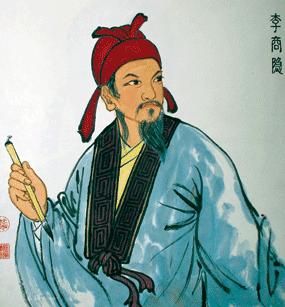(单词翻译:单击)
Li Shangyin (810/813~858), also known as Li Yishan, was a Chinese poet of the late Tang Dynasty, born in Henei (now Qinyang, Henan Province).
李商隐,(810/813 ~858),又叫李义山,晚唐诗人,河内(今河南沁阳)人。
Along with Li He, he was much admired and "rediscovered" in the 20th century by the young Chinese writers for the imagist quality of his poems.
李商隐和李贺因为他们的诗歌具有意象派特质而被20世纪的中国年轻作家重新发现,并备受仰慕。
He is particularly famous for his tantalizing "no title" poems.
李商隐尤以其独道的“无题”诗闻名。
Li had a moderately successful career in the imperial civil service, although he never obtained a high position, either because of factional disputes, or because of his association with Liu Fen, a prominent opponent of the eunuchs.
尽管李商隐从未做过高官,他的官运还是比较顺利的。李商隐未能做高官的原因要么是派系斗争,要么是他与宦官们的劲敌刘芬有牵连。
Li was a typical Late Tang poet: his works are sensuous, dense and allusive.
李商隐是典型的晚唐诗人:他的作品敏感、晦涩、含沙射影。
The latter quality makes adequate translation extremely difficult.
后者让我们很难给他的作品做出恰当的翻译。

The political, biographical or philosophical implications supposed to be contained in some of his poems have been a subject of debate for many centuries in China.
人们认为李商隐的一些作品具有政治性、传记性和哲学性的含意,这此含意已经在中国争论了好几百年。
His most famous and cryptic poem is called "Jin Se" (the title is only taken from the first two characters of the poem, thus also a “no title” poem), which consists of 56 characters and a string of images.
李商隐最著名的、含意最模糊的诗是《锦瑟》(题为该诗前两个字,所以也是“无题”诗)。这首诗共有56个字,由一连串的意象构成。
His "no title" poems are regarded as "pure poetry" by some modern critics.
李商隐的“无题”诗被一些现代批评家看作“纯诗”。
Although more famous for his sensuous poems, Li indeed wrote in many styles.
尽管李商隐更以敏感诗著称,他也确实写过不少风格的诗。
He can be satirical, humorous, or sentimental.
李商隐可以讽刺,可以幽默,可以感伤。
Moreover, some ancient critics hold that he is the only poet who, in some of his poems, succeeds in imitating the masculine quality of Du Fu's works.
而且,一些古代批评家认为,李商隐是唯一的成功地模仿了杜甫诗作的阳性美的诗人。


